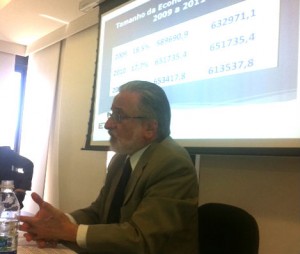Increase in formal employment causes the Underground Economy Index to drop to 17,2%
São Paulo, December 01, 2011 - The Underground Economy Index released today by the Brazilian Institute of Competition Ethics (ETCO) in conjunction with the Brazilian Institute of Economics of the Getulio Vargas Foundation (Ibre / FGV), updated with data from the PME (Monthly Employment Survey), fall of 1,1% in 2011 compared to 2009. After spending 2 years (2008 and 2009) growing at a speed close to that of GDP, the underground economy accentuates the fall rate, reaching, for the first time, the home 17,2%.
The analysis of absolute values also shows a decrease. With the update, the estimate of the 2011 Underground Economy Index was R $ 653,4 billion.
| Size of the Underground Economy | |||||
| % GDP | In millions of reais | ||||
| Current Currencies | Reais at 2010 Prices | ||||
| 2003 | 21.0% | 357388,7 | 571965,3 | ||
| 2004 | 20.9% | 405317,3 | 600410,4 | ||
| 2005 | 20.4% | 438417,5 | 605769,5 | ||
| 2006 | 20.2% | 478455,2 | 622789,6 | ||
| 2007 | 19.5% | 518520,1 | 637527,1 | ||
| 2008 | 18.7% | 566624,2 | 643102,7 | ||
| 2009 | 18.5% | 589690,9 | 632971,1 | ||
| 2010 | 17,7% | 651735,4 | 651735,4 | ||
| 2011 (*) | 17,2% | 653417,8 | 613537,8 | ||
| Source: IBRE / FGV and ETCO (GDP growth in 2011 of 10% (3,5% and 6,5% inflation) | |||||
“In June, it was already possible to intuit that this fall would occur. It was necessary, however, that we have the data update in use to confirm the calculations and close the forecast, which is confirmed with the Index presented today ”, says the researcher at Ibre / FGV, responsible for the study, Fernando de Holanda Barbosa Filho. In his analysis, he reaffirms that access to credit remains the biggest motivator for formalizing employment by employees. "For employers, in addition to access to credit, another factor of influence is the consistency of the country's economic growth," assesses Barbosa Filho.
For ETCO's executive president, Roberto Abdenur (photo), “although Brazil still has a huge way to go, in order to purge from society the deviations that produce this exorbitant value on the margins of the formal economy, the country begins to trace a trajectory of institutional modernization that makes us optimistic about the future ”.
“It is the duty of public authorities and authorities, as, indeed, of the whole of society, to keep a critical and constant eye on the numbers presented today. It is time to take possession of this healthy advance in the Brazilian economy and continue an economic policy that has contributed to improving this situation ”, concludes Abdenur.
Informality, in addition to its relationship with organized crime and precarious working relationships, brings direct damage to society, creates an environment of transgression, and encourages opportunistic economic behavior, with a drop in the quality of investment and a reduction in the potential for growth of the Brazilian economy. In addition, it causes a reduction in government resources for social programs and investments in infrastructure.




